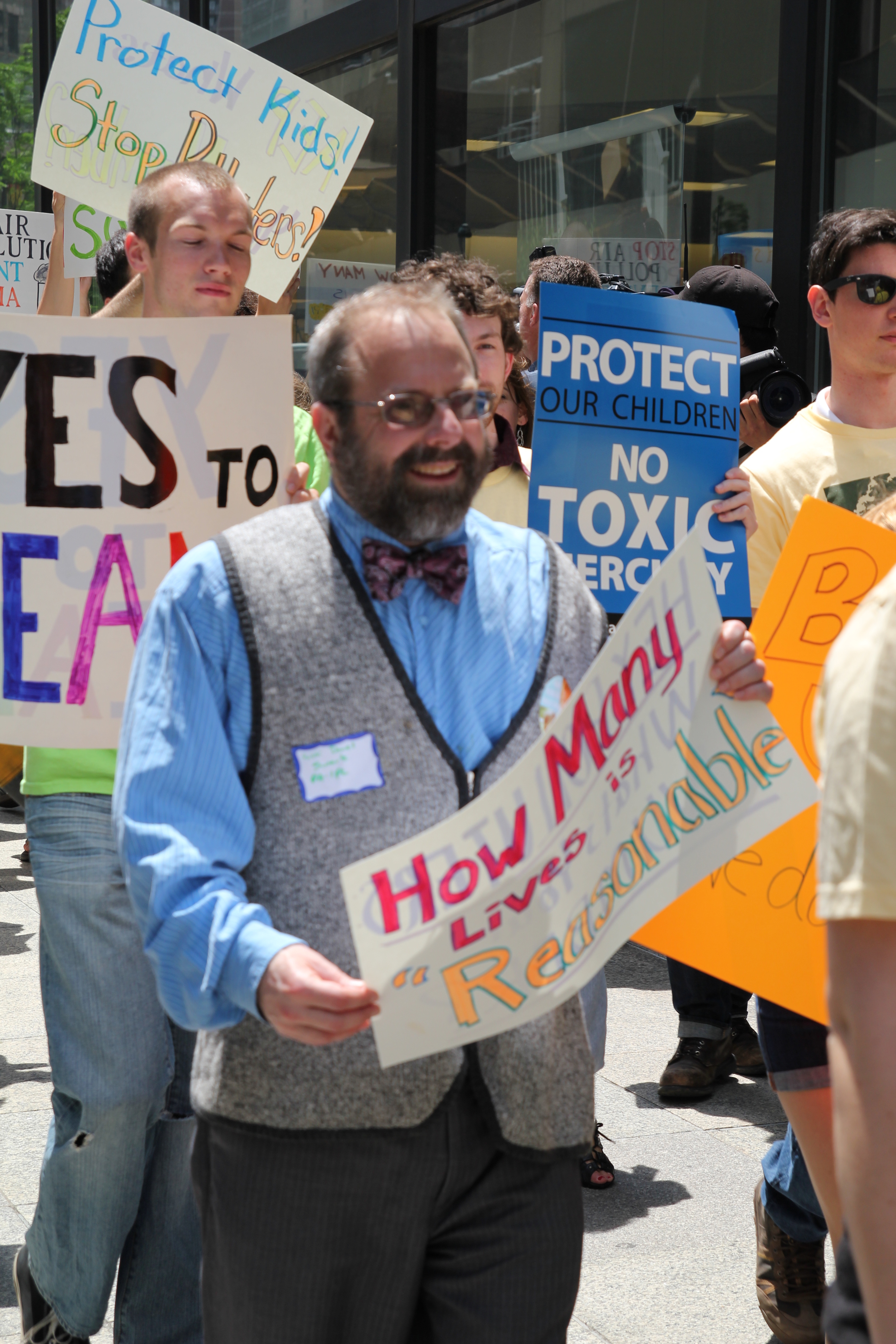 Marchers outside of the Liberty Place | Image via Sierra ClubYesterday, environmental groups, protesters, families, doctors, religious leaders, students, concerned citizens, and doctors gathered at the Westin in downtown Philadelphia to participate in a day long EPA public hearing and thirty minute press conference focused on the need for protection from mercury.
Marchers outside of the Liberty Place | Image via Sierra ClubYesterday, environmental groups, protesters, families, doctors, religious leaders, students, concerned citizens, and doctors gathered at the Westin in downtown Philadelphia to participate in a day long EPA public hearing and thirty minute press conference focused on the need for protection from mercury.
Mercury and air toxins, caused primarily by power plants, contribute to some of the greatest threats to public health and child development in Pennsylvania. Hazardous air pollution is linked to health problems including cancer, heart disease, neurological damage, birth defects, premature death, and, as mentioned many times throughout the day, asthma. If toxins were handled more efficiently, “120,000 kids would not be diagnosed with asthma each year,” Kevin Pflug of the Sierra Club explained. Coal plants are responsible for 99 percent of mercury emissions.
As mentioned by Dr. Kevin Osterhoudt, medical director of the Poison Control Center at CHOP, throughout our nation’s history (much of which is entrenched in Philadelphia) we have been granted “certain unalienable rights.” These rights include the right to breathe fresh air and drink clean water. Though many coal-fired power plants argue the large cost of making any changes, such as greater regulations on emissions or shifting to clean energy sources, not doing anything comes at a much greater cost: health. As “avid fisherman” Ed Perry stated yesterday, the real cost of contamination is the health of families and children.
Continuing the discussion of cost, Jim Black from Delaware’s Partnership for Sustainability, explained that the cost of healthcare is much greater than the cost of coal. He believes that moving to different forms of energy would actually enable “significant savings” both economically and health-wise. To maintain the Rabbi Daniel Swartz enthusiastically marching in the group | Image via Sierra Club cleanliness of the air we breathe “we depend on the EPA,” said Mervyn Kline, a retired science teacher and environmentalist who attended the press conference. “[It is] cheaper to reduce emissions than to pay for the required health care.”
Rabbi Daniel Swartz enthusiastically marching in the group | Image via Sierra Club cleanliness of the air we breathe “we depend on the EPA,” said Mervyn Kline, a retired science teacher and environmentalist who attended the press conference. “[It is] cheaper to reduce emissions than to pay for the required health care.”
Jack Miller, who worked near a coal plant in Ocean City and used to eat local fish, was out fishing one day after learning he had elevated levels of mercury in his blood. When Miller caught a bluefish he “was afraid of this fish,” knowing the toll eating it could take on him. He was very confused by the fact that in the past the U.S. solved many huge problems, mentioning previous pollution issues and diseases such as the polio epidemic, but now it seems as though “we will be paying for this with our children.”
Many supporters of the EPA’s proposed federal standards for air pollution from power plants who attended yesterday’s event were confused by the U.S.’s lack of protection and regulations when it is evident that coal has harmful effects. According to the EPA, about 48 tons of mercury is pumped into the air every year from coal-fired power plants, which are among the largest source of federally unregulated mercury pollution in the country. In the Clean Air Act and the proposed “Power Plant Maximum Achievable Control Technology” standard, the EPA can employ safe practices that will limit our exposure to these toxic air pollutants, including mercury, arsenic, lead, dioxin, and acid gases.
Paul J. Mellon Jr., of Novetas Solutions, LLC believes that right now is the perfect opportunity for the EPA to share information about the effects of mercury toxins. He held up a large brown paper bag of what appeared to be coal ash that was purchased nearby and announced that the bag’s label stated it was “100 percent coal combustion waste” and low hazard. As it has become evident that it is hazardous, this bag displays some of the false information relayed to the public.
 Mariko Franz, one of the many moms rallying for more protection and regulations, with her daughter Amaya | Image via Sierra ClubAs Jack Miller mentioned, coal is not only harming us, but also displays the increasing gap between the very wealthy and those not as wealthy. Leslie Fields, Sierra Club Environmental Justice and Community Partnerships Program Director, also chimed in on the socioeconomic topic, describing the large toll mercury has taken on low-income and industrial areas. Asthma attacks happen most often in these communities. In addition mercury affects communities that fish, where the livelihoods of many families rely on the practice.
Mariko Franz, one of the many moms rallying for more protection and regulations, with her daughter Amaya | Image via Sierra ClubAs Jack Miller mentioned, coal is not only harming us, but also displays the increasing gap between the very wealthy and those not as wealthy. Leslie Fields, Sierra Club Environmental Justice and Community Partnerships Program Director, also chimed in on the socioeconomic topic, describing the large toll mercury has taken on low-income and industrial areas. Asthma attacks happen most often in these communities. In addition mercury affects communities that fish, where the livelihoods of many families rely on the practice.
A large focus of the hearing was also on the toll that air pollution takes on children. Mariko Franz, a concerned mother, brought her daughter up with her to speak as she described the toll it took on her child. When her daughter was nine-months-old, she had elevated levels of lead in her blood. Mercury, similar to lead, can cause analogous health problems.
During the press conference, moderator Joe Minott stood in front of a podium with the sign “BIG COAL makes us sick” and encouraged the many children in attendace to come forward and sit on the floor at the front of the room. He believes that the main purpose of the EPA’s Air Toxics rule in PA, a state ranked second nationally for mercury emissions from power plants, would be for “protecting their future and their health,” he said as he looked towards the children. “One in twelve women of child-bearing age has enough mercury to put her child at risk,” local mother Gretchen Alfonso explained, mirroring Minott’s sentiment.
With the completion of her words began the “Stroller Brigade.” Moms, activists, and concerned residents came together in front of the hotel to begin chants and a walk around the block to display that the EPA’s proposed regulations are ultimately about health, especially the health of children.
-Allison Bart







